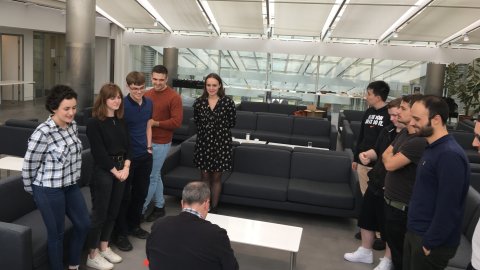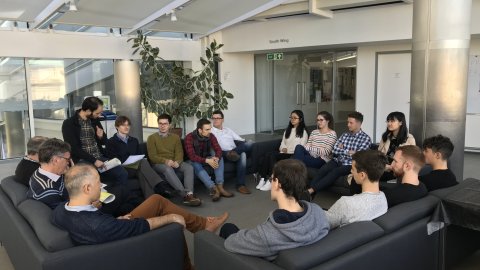Primal-dual Newton methods, with application to viscous fluid dynamics
Abstract
I will discuss modified Newton methods for solving nonlinear systems of PDEs. These methods introduce additional variables before deriving the Newton linearization. These variables can then often be eliminated analytically before solving the Newton system, such that existing solvers can be adapted easily and the computational cost does not increase compared to a standard Newton method. The resulting algorithms yield favorable convergence properties. After illustrating the ideas on a simple example, I will show its application for the solution of incompressible Stokes flow problems with viscoplastic constitutive relation, where the additionally introduced variable is the stress tensor. These models are commonly used in earth science models. This is joint work with Johann Rudi (Argonne) and Melody Shih (NYU).
--
A link for this talk will be sent to our mailing list a day or two in advance. If you are not on the list and wish to be sent a link, please contact @email.
14:00
Regularity, stability and passivity distances for dissipative Hamiltonian systems
Abstract
Dissipative Hamiltonian systems are an important class of dynamical systems that arise in all areas of science and engineering. They are a special case of port-Hamiltonian control systems. When the system is linearized arround a stationary solution one gets a linear dissipative Hamiltonian typically differential-algebraic system. Despite the fact that the system looks unstructured at first sight, it has remarkable properties. Stability and passivity are automatic, spectral structures for purely imaginary eigenvalues, eigenvalues at infinity, and even singular blocks in the Kronecker canonical form are very restricted and furthermore the structure leads to fast and efficient iterative solution methods for asociated linear systems. When port-Hamiltonian systems are subject to (structured) perturbations, then it is important to determine the minimal allowed perturbations so that these properties are not preserved. The computation of these structured distances to instability, non-passivity, or non-regularity, is typically a very hard non-convex optimization problem. However, in the context of dissipative Hamiltonian systems, the computation becomes much easier and can even be implemented efficiently for large scale problems in combination with model reduction techniques. We will discuss these distances and the computational methods and illustrate the results via an industrial problem.
--
A link for this talk will be sent to our mailing list a day or two in advance. If you are not on the list and wish to be sent a link, please contact @email.
16:00
Boundaries, Factorisation & Mirror Duality
Abstract
I will review recent work on N=(2,2) boundary conditions of 3d
N=4 theories which mimic isolated massive vacua at infinity. Subsets of
local operators supported on these boundary conditions form lowest
weight Verma modules over the quantised bulk Higgs and Coulomb branch
chiral rings. The equivariant supersymmetric Casimir energy is shown to
encode the boundary ’t Hooft anomaly, and plays the role of lowest
weights in these modules. I will focus on a key observable associated to
these boundary conditions; the hemisphere partition function, and apply
them to the holomorphic factorisation of closed 3-manifold partition
functions and indices. This yields new “IR formulae” for partition
functions on closed 3-manifolds in terms of Verma characters. I will
also discuss ongoing work on connections to enumerative geometry, and
the construction of elliptic stable envelopes of Aganagic and Okounkov,
in particular their physical manifestation via mirror duality
interfaces.
This talk is based on 2010.09741 and ongoing work with Mathew Bullimore
and Samuel Crew.
12:00
Phase Analysis for a family of stochastic reaction-diffusion equations
Abstract
We consider a reaction-diffusion equation of the type ∂tψ=∂2xψ+V(ψ)+λσ(ψ)W˙on (0,∞)×?, subject to a "nice" initial value and periodic boundary, where ?=[−1,1] and W˙ denotes space-time white noise. The reaction term V:ℝ→ℝ belongs to a large family of functions that includes Fisher--KPP nonlinearities [V(x)=x(1−x)] as well as Allen-Cahn potentials [V(x)=x(1−x)(1+x)], the multiplicative nonlinearity σ:ℝ→ℝ is non random and Lipschitz continuous, and λ>0 is a non-random number that measures the strength of the effect of the noise W˙. The principal finding of this paper is that: (i) When λ is sufficiently large, the above equation has a unique invariant measure; and (ii) When λ is sufficiently small, the collection of all invariant measures is a non-trivial line segment, in particular infinite. This proves an earlier prediction of Zimmerman et al. (2000). Our methods also say a great deal about the structure of these invariant measures.
This is based on joint work with Carl Mueller (Univ. Rochester) and Kunwoo Kim (POSTECH, S. Korea).



